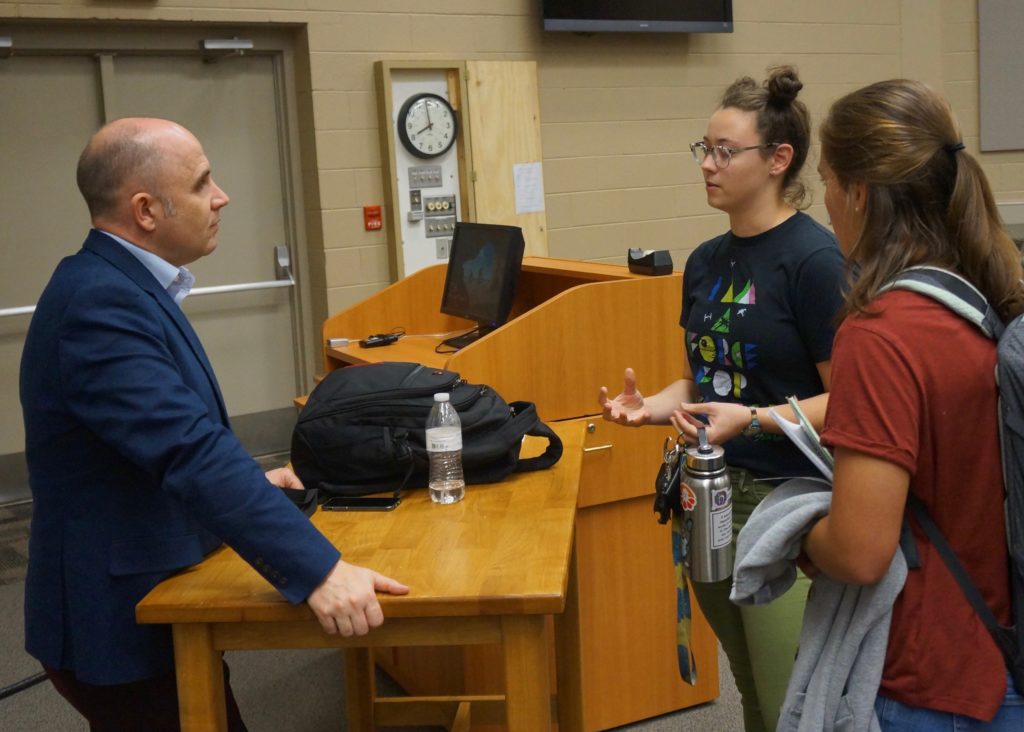Students, faculty, and the community gathered in Hyder auditorium last Wednesday night to hear David Blevins, lead journalist from Ireland, speak about his experience as a journalist during a time of tension in Northern Ireland. He started his lecture by giving a brief history of Ireland and explaining how England seized the country starting a territorial war that lead to the persecution of Catholics. In 1995, he reported on the tensions that the community faced and covered a series of bombing and terrorist attacks that targeted Catholic families. Among the chaos, it took four years to reach a peace settlement that would end the religious and territorial war in Northern Ireland.
Blevins discussed his role as a journalist in conflict by using three rules to report any type of news, especially political news that can have widespread impact. The first rule is to have every voice heard; journalists must include every individual and get both sides of the story. The second rule is to read between the lines and offer as much insight from the scene or topic as the journalist can provide with research. The final, third rule is to have space for good news, especially if the prior news deals with a more serious topic that needs relief from all the pandemonium .
With 29 years of journalism experience, Blevins says that, “citizens were the highlight and grace of the situations” he reported on which includes the Holy Cross Dispute and the Good Friday Agreement where Blevins met all the victims who were affected. Blevins was impacted by one victim named Gordon Wilson who lost his daughter to a bomb attack that was intended to kill soldiers and policemen at a memorial service.
Wilson said in an interview, “I have lost my daughter, and we shall miss her. But I bear no ill will. I bear no grudge. Dirty sort of talk is not going to bring her back to life… I shall pray for those people.” According to CAIN [Conflict Archive on the Internet], Wilson was also involved with improving community relations by meeting with representatives of the Irish Republican Army and was appointed to the Senate of the Republic of Ireland.
Blevins felt a calling to leave the journalistic life to serve part time in Christian ministry after a career in reporting. However, he returned to journalism once again and decided to follow a principle of “truth.” His faith led him to report stories with a Christian understanding and to tell ethically accurate stories following his three rules of his role as a journalist. During an encounter with the prime minister of Ireland, Blevins recorded the prime minister saying that he “isn’t part of a specific religion, but [he] is still searching for the truth.”
Though Ireland is the first country to legalize same-sex marriage by popular vote and legalized abortions and contraceptives, there is still a lot of tension with religious views. Yet, Blevins says that we still need to spend more time with each other and gather an understanding. He states that it is dangerous to tell the individual that they are “not allowed to make a choice” when addressing to someone with gospel teachings. The Catholic Church ruled Ireland with an iron fist before making the popular decision of making same-sex marriage, abortion, and contraception legal. Its influence disappeared with social change and still needs to take caution when addressing those topics.
During several audience questions, the topic of the press and media influencing tension was brought to attention. Blevins believes that “America needs to protect the press – the first amendment” and make sure that the press does not have any bias. He also stated that social media has “influenced the news by not providing accurate sources and spreading false news,” and we need to “watch other news sources outside of America to get a better perspective and avoid the bias” that our current news may have. He mentions that journalism is “damaged with opinion,” and journalists need to “invest more time with facts and present them to get the trust of the people back” – in other words, journalism needs to be redeemed.
Mandy Lorch, a sophomore who is double majoring in film studies and humanities, stated that Blevins’s lecture “offered some deep and meaningful ways to incorporate faith into calling.” She also believes that “it should be an integral part of [her] character reflected in the way [she tells] stories and live out [her] life.” In Blevins’s lecture, there was a discussion about polarization in America that is fueling the tensions within the country and community. After asking Mandy about the tensions within our own community at Milligan and around the area, she mentioned the following:
“I often worry about the future of the seemingly divided country I live in. However, I believe there is hope in listening to others, in hearing others’ stories and in recognizing that they are human too. I believe in actively seeking out people on the other side of the political or religious spectrum and starting conversations across partisan lines. I think the more we talk to each other instead of about each other, the better we can make peace with the people we sometimes perceive as threats. I also believe in telling good news… When we hear stories about ordinary people bridging barriers and fighting for peace, we can be inspired to do the same. The path to peace in polarized times is listening to the stories of others and sharing good news.”

